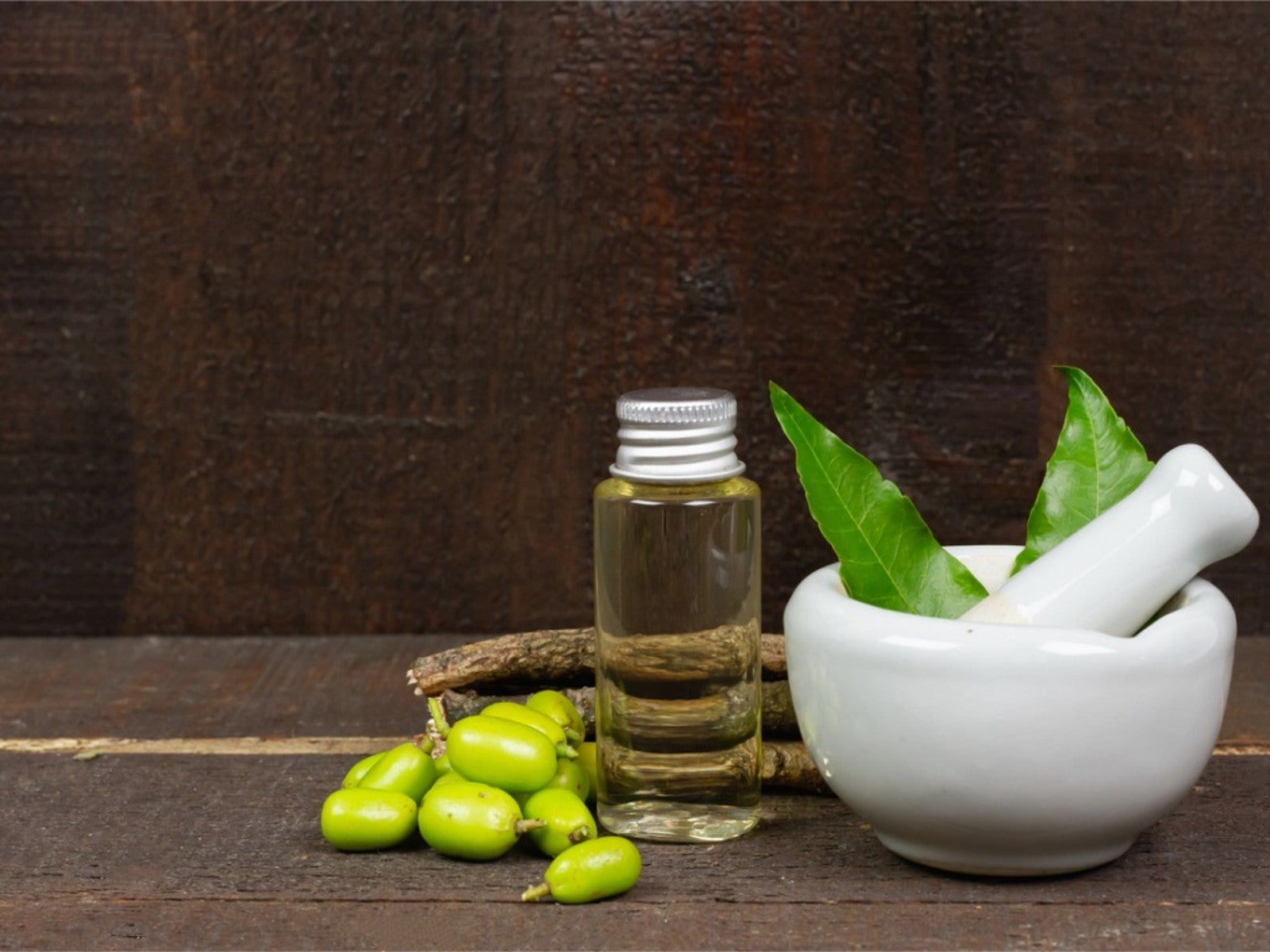Helping Your Plants With A Neem Oil Foliar Spray
Neem oil may be your best solution as a safe, non-toxic pesticide for the garden that actually works.

Mary Ellen Ellis

Pests and fungal infections can be real problems in the garden despite your best efforts. There are plenty of chemical pesticides and fungicides on the market, but for something natural and safer, try neem oil.
We all want to protect the environment, our families, and our food, but many natural chemicals have limited effectiveness. Neem oil insecticide is an exception. Neem oil can safely be used on food, it leaves no dangerous residue in the soil, and effectively reduces or kills pests.
What Is Neem Oil?
A natural pesticide with some fungicidal properties, neem oil is made from the seeds of the neem tree (Azadirachta indica). The primary active insecticidal ingredient in neem oil is azadirachtin. The neem tree is native to South Asia, where it has been used as an insecticide and in soaps, waxes, cosmetics and oils for hundreds of years.
It deters insects from feeding on plants and regulates growth. Rather than killing pests, neem oil stops them from eating and growing. For this reason, it is most effective when targeting insects in their immature stages.
Neem Oil Benefits
Of the many products on the market for managing pests and fungal infections, neem oil has some exceptional benefits. The primary benefit is that it’s non-toxic and natural. While harmful to certain insects, its toxicity in mammals is low. It does not produce a toxic buildup in the environment and is safe for most plants when used as directed. You can use neem oil safely on vegetables.
Neem oil is also a useful repellent for mites and is used to manage over 200 other species of chewing or sucking insects according to product data. It helps manage populations of a variety of pests, including:
- Aphids
- Thrips
- Whiteflies
- Mealybugs
- Spider mites
- Caterpillars
- Nematodes
- Scale
- Whiteflies
Uses of neem oil also include battling fungal infections, but it is less effective for this purpose. It is most often used to manage powdery mildew on plants, but once any fungal infection has set in, controlling it is challenging.
Sign up for the Gardening Know How newsletter today and receive a free copy of our e-book "How to Grow Delicious Tomatoes".
Neem Oil as an Insecticide
As an insecticide, neem oil is pretty effective. It works best when the insects are in immature stages. A coating of oil on foliage can suffocate insects, killing them, but neem mostly works as the plant absorbs and metabolizes it. When insects feed on the plant that has absorbed neem oil, they stop eating. It also interferes with insect hormones, stopping growth, egg laying, and other life cycle behaviors. While neem can be effective against pests, it is not a quick fix. It may take several applications to see results.
Neem Oil as a Fungicide
Neem oil can be used as a fungicide as well, but its effectiveness is limited. It may help control infections from fungus, mildews and rust by preventing spores from germinating and penetrating plant tissue. It will not cure a plant that is already infected with a fungus, but it can help slow or prevent the spread of infection to healthy tissue. It works best on powdery mildew. It is also deemed helpful for other issues such as:
- Root rot
- Black spot
- Sooty mold
How to Use Neem Oil on Plants
Neem oil foliar spray has been shown to be most useful when applied to young plant growth. The oil has a half-life of 3 to 22 days in soil, but only 45 minutes to four days in water. It is nearly non-toxic to birds, fish, bees, and wildlife, and studies have shown no cancer or other disease-causing results from its use.
Apply neem oil at a time of day when bees aren’t typically out foraging for pollen, such as night time or early in the morning. Insects would have to eat the treated plant, so neem oil is very safe to use if it’s applied properly.
You can find neem oil spray in most garden centers, either in a concentrated form that must be diluted with water or as a ready-to-spray product. You can also get neem oil spray on Amazon, such as this Captain Jack's Neem Oil Spray, which is an insecticide, fungicide, and miticide all-in-one. Thoroughly cover leaves, including their undersides and stems. Because the plant absorbs the neem oil, you don’t have to worry about rain washing it away.
While neem oil is largely safe, some plants might be sensitive to it. Before covering a plant entirely in neem oil, test a small area and see if it causes damage. To reduce the risk of damage, avoid using neem oil in bright sunlight or when it is very hot. It’s better to apply it in the evening to give the plant time to absorb it. Don’t use it on plants you have just transplanted or are under stress.
How Does Neem Oil Work?
In many plants, neem oil insecticide works as a systemic when applied as a soil drench. This means it is absorbed by the plant and distributed throughout the tissue. Once the product is in the plant’s vascular system, insects take it in during feeding.
The compound causes insects to reduce or cease feeding, can prevent larvae from maturing, reduces or interrupts mating behavior, and, in some cases, the oil coats the breathing holes of insects and kills them.
Apply neem oil only in indirect light or in the evening to avoid foliage burning and to allow the treatment to seep into the plant. Also, do not use neem oil in extreme temperatures, either too hot or too cold. Avoid application to plants that are stressed due to drought or overwatering.
Using neem oil insecticide about once a week will help kill pests and keep fungal issues at bay. Apply as you would other oil-based sprays, making sure the leaves are completely coated, especially where the pest or fungal problem is the worst.
Is Neem Oil Safe for Dogs and People?
Neem oil is generally safe for people, pets, and most wildlife. Because pollinators and other beneficial insects do not chew plants, they should not be affected by neem on plants. Neem oil does not stay long in the environment, so its impact is minimal.
Although considered safe, you should still take precautions when using neem oil. Spray neem oil on plants only as directed and wear gloves. It can potentially irritate your eyes or skin. Children may be more sensitive to azadirachtin. Anyone pregnant or trying to become pregnant should avoid neem oil entirely. The EPA deems neem oil to be generally recognized as safe, but you should always wash your produce in clean, potable water before consumption.
As with any pesticide, use neem oil as a last resort. Prevention is always best. Use healthy plants and practice good garden management to minimize pest issues and fungal infections.

Heather Rhoades founded Gardening Know How in 2007. She holds degrees from Cleveland State University and Northern Kentucky University. She is an avid gardener with a passion for community, and is a recipient of the Master Gardeners of Ohio Lifetime Achievement Award.
- Mary Ellen EllisWriter